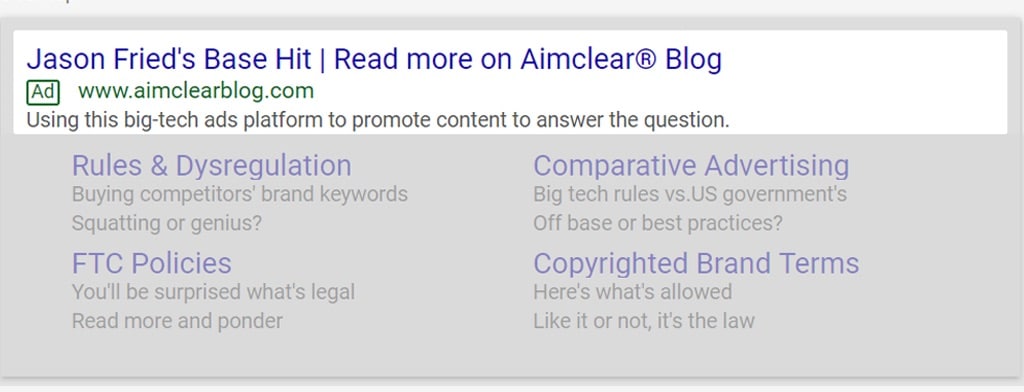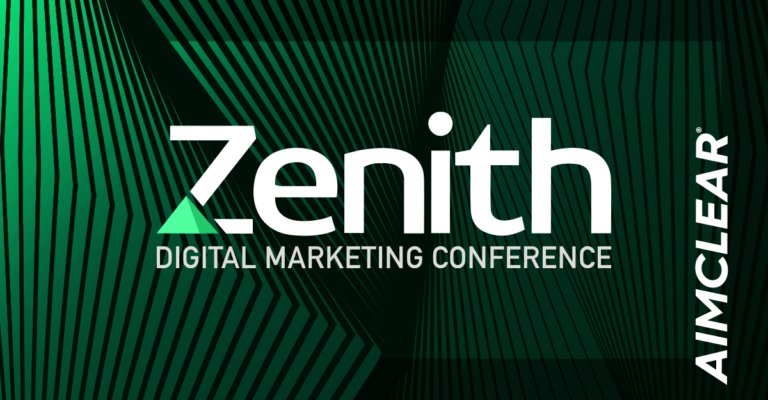Jason Fried, Co-Founder & CEO of Basecamp, incited a teapot tempest among marketers and some business types. His assertion, oft tendered by our SEO community, alleges that Google unfairly allows competitors to trigger search ads with others’ brand terms.

Jason’s ire is understandable and his tactic to raise awareness was clever. Basecamp purchased a Google search ad sporting protest creative, triggered by keyword, “Basecamp.” Marketers refer to such practices as “Defending the brand with paid search.” LOL. ROFL. Nicely done, Jason.

Rules & Dis-regulation
Here are the rules: Google allows marketers to TRIGGER ads with competitors’ protected brand keywords. However, Google does not allow marketers to DISPLAY competitors’ protected marks, ®, ™, etc. Google’s policy is more restrictive than actual American rules, protecting brands to a greater extent than our government.
In America, authentic comparison ads are plenty legal. Jason speaks with disdain of what Google DOES allow; he does not mention two important facts. The practice of keyword triggering has been adjudicated as legal multiple times. And, there are other brand-squatting practices, legal in America, which Google does NOT allow. Take comparative ads as an example. Count your lucky stars that Google does not allow classic comparative ads in search.
In 1979, The United States Federal Trade Commission (FTC) investigated industry trade associations and the advertising media regarding comparative advertising policies. The FTC ruling defined comparative advertising as “advertisement that compares alternative brands on objectively measurable attributes or price, and identifies the alternative brand by name, illustration or other distinctive information.” Citing non-disparagement and substantiation (not false, deceptive, or confusing), the FTC gave its blessing to one brand using another’s intellectual property for advertising.
“…we know of no rule of law which prevents a seller from honestly informing the public of the advantages of its products as opposed to those of competing products.” 60 F.T.C. at 796.
Google, on the other hand, does NOT allow advertisers to display another brand’s protected marks in paid search ads, not even for FTC-sanctioned comparative ads. In reality, Google protects your brand more than the government. Also, there’s a growing body of case law confirming competitive keyword advertising does NOT constitute confusion.
Copyrights, Brand Terms, SEOs & Google
SEO is the art and science of attaining free keyword prominence in search engines for copyrighted websites. Obviously, if other brands are buying ads they’ll appear above your free listing. SEOs resent that Google monetizes their brand keywords, causing the need to buy brand defense search ads. Site owners pony up their copyrighted and trademarked content and think it’s extortion that Google’s setup forces brands to buy their own brand keywords.
We know brand ads can be more effective than organic results, lifting an array of efficiencies including traffic and conversion. We buy brand keywords intentionally because we totally control creative and destination URLs for every site link. For integrated, channel-agnostic marketers, buying ads for brand terms is a no-brainer. We choose to do it even when nobody is competing much of the time. AND, buying your own brand terms as best practice serves the purpose of defending against competitors legally showing ads for our keywords. Bring it. We have an inherent advantage in Google because OUR ads can use OUR brand’s protected marks. Competitors’ ads can’t.
Back to Basecamp
Jason cleverly piggybacked advertising, trafficking on sentiment of competitors’ brands – a tactic as old as dirt. This is one of many old school methods dating back to well before the Internet. A person with a sandwich board sign, a human billboard, paces the streets outside a competitor’s joint, directing foot traffic in a long line down the street where there is no wait. ESPN can buy baseball stadium billboards promoting ESPN for games NBC is broadcasting. Viewers see the billboards. Aggressive marketers engage in comment threads owned by a competitive brand. Legit comparative advertising has been a legal, accepted practice in America for forty years, codified in case law repeatedly. So long as these marketers all follow the rules, no problem.
The last 20 years of free traffic from Google was a one-time perk for early adopters, and not indicative of history in any other channel. Maybe it’s time to accept that reality and move on.
Finally, nice work Jason. This little flap about Google Ads is wonderful PR. What you pulled off is actually a great example of what a clever brand can accomplish buying brand terms.









